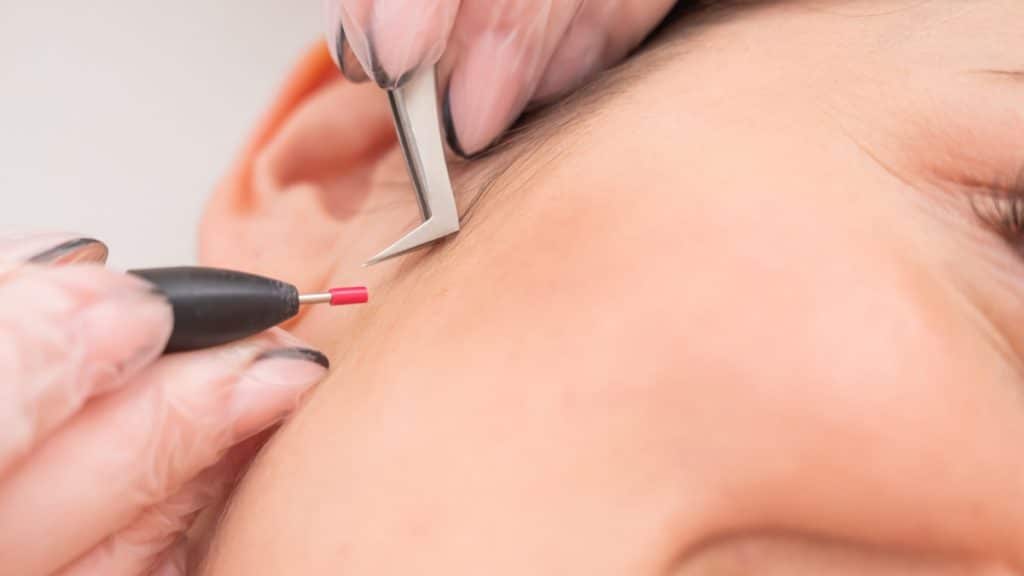Electrolysis hair removal is a permanent hair removal technique that stops new hair growth by destroying the hair follicle with an electric current. This method is frequently regarded as one of the most effective ways to achieve permanent hair removal. Join us to learn more valuable information about this method.
How is it Done?
Insertion of a Fine Probe:
The electrolysis procedure starts by inserting an extremely tiny, sterile probe into each individual hair follicle. These probes are made especially to fit the targeted hair’s diameter. This step must be done precisely to guarantee that the electric current reaches the hair follicle.
Application of Electric Current:
A precisely regulated electric current is then given to the targeted hair follicle once the probe is firmly in position. The electrolysis process depends on heat, which is produced by this current. Moreover, the specifics of the hair being treated and the patient’s tolerance level are taken into account while determining the appropriate quantity of electric current to apply.
Destruction of Follicle:
The follicle’s hair-growing cells suffer thermal damage as a result of the localized heat produced by the electric current. This damage makes it more difficult for the follicle to produce new hair. The method’s accuracy guarantees that just the intended hair follicle is impacted, sparing the surrounding skin from harm.
Removal of Treated Hair:
After the hair follicle is destroyed by the application of electric current, the treated hair is extracted. Forcing the hair out of the follicle is usually accomplished using forceps or another appropriate tool. An important factor in the procedure’s overall efficacy is the removal of treated hair.
Repeat Sessions:
The process of electrolysis is often carried out over a number of sessions. This is because it works best when given during the hair cycle’s active growth stage. The size of the treatment region, the density of the hair, and the degree to which individual hair follicles respond to the therapy all affect how many sessions you are going to need.
What Are The Side Effects of Electrolysis Hair Removal?
Like any other procedure, electrolysis hair removal has a few side effects. Here are a few examples of them.
Temporary Redness and Swelling:
People frequently experience transient redness and swelling in the treated area after electrolysis. These adverse effects are usually not very severe and typically go away a few hours after the session.
Skin Discoloration:
After electrolysis, there is a rare possibility of transient skin darkening. But this is usually a temporary effect that you wouldn’t have to worry about because the skin color returns to normal in the end.
Pain and Discomfort:
Everybody experiences electrolysis differently, even in terms of sensations. During the operation, some people may experience slight discomfort or a stinging sensation; however, these side effects are usually tolerable and often go away quickly.
Potential Scarring:
Scarring may result from attempts to do electrolysis incorrectly or at home. Hiring a qualified and experienced electrologist is essential to reducing this risk and guaranteeing the best possible outcome.
Ingrown Hairs:
Ingrown hairs are a rare side effect of electrolysis that can result in irritation and perhaps infection. It is possible to reduce this risk and encourage a seamless recovery process by adhering to the appropriate aftercare recommendations that the electrologist has supplied.
What Are The Advantages of This Method?
Permanent Hair Removal:
The ability of electrolysis to permanently remove hair is one of its main benefits. It offers a long-lasting solution by focusing on and eliminating the hair follicle, reducing the need for repeated hair removal operations.
Versatility:
Electrolysis is a flexible technique that works well on a range of skin and hair types. This makes it a flexible choice that can be tailored to meet individual demands and accommodate people with a range of advantages.
Precision:
What makes electrolysis so unique is its accuracy. The method makes sure that only undesirable hairs are impacted, sparing the surrounding skin, by carefully focusing on specific hair follicles. This accuracy is especially useful in situations when precision is crucial.
Safe:
Electrolysis is typically regarded as safe when carried out by a trained and experienced practitioner. To avoid infections and guarantee the patient’s safety during the treatment, strict attention to cleanliness and sterilization regulations is essential.
No Regrowth:
Regrowth is improbable once electrolysis has successfully treated a hair follicle. Because the solution is permanent, people can experience a reduction in the amount of hair growth in the treated areas, which increases the method’s overall efficacy.
In Conclusion:
Numerous hair removal techniques exist that are both cost-effective and efficient, therefore, thoroughly consider your possibilities before choosing. To ensure safety and efficacy, it’s also critical to remember that electrolysis should only be carried out by qualified experts. Before undertaking any kind of hair removal procedure, make sure you speak with a licensed electrologist or other healthcare provider. Don’t forget to share your experience with this hair removal method in the comments!
Angela Spearman is a journalist at EzineMark who enjoys writing about the latest trending technology and business news.

